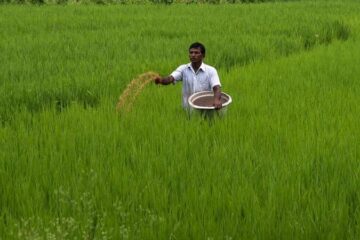A new edition of the Development Drums podcast is now available online. Malini Mehra from the Center for Social Markets and Alex Evans from the Center on International Cooperation at NYU take a step back and look at the broad sweep of the big development challenges of the 21st century.

Malini Mehra and Alex Evans discuss the big development challenges of the 21st Century in Development Drums 25
Alex Evans and I recently took part in a discussion of the big development issues with a committee of Members of Parliament in the British House of Commons. Alex kicked off that meeting with a magisterial and somewhat pessimistic presentation which set out ten key issues for development, and we took his presentation as our agenda for this discussion on Development Drums.
Malina and Alex are interesting and knowledgeable on a dauntingly wide range of issues, and the podcast covers a lot of ground: the changing distribution of global poverty; demographic change; the financial crisis; oil prices; food prices; feeding the 9 billion; climate change; trade; the changing face of conflict; the global governance deficit; and the implications for UK development policy. Each of these issues really needs an entire episode of Development Drums to be discussed properly, but I thought it was interesting to bring them all together to draw out common issues and ideas.
The following thoughts struck me from the discussion:
First – the importance of resilience which cropped up again and again in the discussion. I think this is possibly the Next Big Thing in development thinking (as if we need more Big Things). The idea is that we should be helping to develop the institutions and assets that ensures that people are resilient to shocks, of which there seem to be likely to be more.
Second – treating shocks as opportunities as well as risks. As Alex points out in the podcast, there was a narrow window after the collapse of Lehman Brothers during which we could have remade the global financial system: but nobody had a plan ready to go. There are going to be more shocks: will the progressive development community be ready to seize the opportunities these represent?
Third – the almost complete failure of global governance. All the issues we discuss relate in some way to the failure to put in place effective global processes and institutions to solve collective action problems such as on trade, climate change, or food supply. As Malini says, we are living in an era not of the G-8 but of G-0. Alex provides an interesting analysis of the problems in the podcast: on the face of it, to my mind, the problems don’t sound insurmountable.
Fourth – the optimism and energy coming from emerging countries such as India and China. Malina both describes and embodies this. But it’s also clear that on many issues – notably trade and climate change – the interests of these increasingly powerful countries are now diverging from those of the less developed countries, and we need to think hard about ensure the interests of the poorest countries are not left behind a grand bargain between the old and new rich countries.
Fifth – development policy isn’t mainly about aid. In a discussion which surveys the big development challenges confronting us, aid hardly gets a mention. Yet most of the development agencies in the world spend most of their time thinking about aid.
How to listen to development drums
You can listen to Development Drums on your computer straight from the website (http://developmentdrums.org) or download any episode (from here) to your MP3 player or computer. Alternatively, you can subscribe to Development Drums on iTunes free of charge (search for “Development Drums” in the iTunes store).
As is the Development Drums custom, the podcast plays out with a slightly relevant song. See if you can guess before you get to the end what it’s going to be (there’s a clue hidden in the title of the podcast, Episode 25: Global Development Challenges).
Other development podcasts
I find podcasts a convenient way to keep up to date, especially when I’ve got long plane flights or trips by road; and lots of people listen to them when running on the treadmill in the gym or during their commute.
If you enjoy Development Drums, you may also enjoy the Center for Global Development’s Global Prosperity Wonkcasts, which are a bit shorter than Development Drums. As with Development Drums, you can listen online, subscribe to the feed or subscribe free on iTunes.
The Guardian has also recently started a monthly development podcast. The most recent editions are about “securitisation of aid” (that is, greater focus of aid on fragile states) and on so-called “Land Grabs“. Again, you can subscribe to the feed directly, or get it free on iTunes.
Here’s a complete list of development podcasts:
- Development Drums
- The Center for Global Development Prosperity Wonkcast
- The Guardian Focus Podcast
- Think Before You Give
- BBC Africa Today
- Peterson Perspectives
- PRI: Global Health and Development
- The World Bank Podcasts
- Philanthropy This Week
- PRI: The Changing World
Other economics podcasts
Tim Harford (author, and FT leader writer) has just compiled a list of the best economics podcasts.



3 Comments
rick davies · February 10, 2011 at 5:57 pm
“Resilience” sounds like sustainability re-branded. Or is it a more ambitious version of sustainability? If the latter, lets try to keep our ambitions within reach, rather than continuosly extend them way beyond what we can currently achieve. Just getting things to work better would be great, and satisfy many people. Getting things to continue to work better would be better still. Getting things to continue to work well in the face of external shocks, and perhaps internal contradictions,… well maybe that would be nice. But if shocks can opportunities as well as risks, then just how much resilience do we really want? Next big thing? Pass.
Owen Barder · February 10, 2011 at 6:07 pm
Rick – I’ve been rather reluctant to drink the ‘resilience’ Kool Aid, but in the podcast Alex and Malini make a pretty compelling case.
Aid does work, depending on the meaning of the word “work” | Short Sentences · February 18, 2011 at 1:43 pm
[…] There are also costs of doing aid. Or, if you don’t like my crass economics term, there are repercussions, unintended consequences, side effects, and philosophical and psychological and moral considerations to be made. With an aid-centric mindset, believing that WE always have a role and a duty to go help THEM with aid, it’s pretty easy to subconsciously divide the world in two: my part and the part that should be pitied. (and Barder also recently noted that “development policy isn’t mainly about aid.”) […]
Comments are closed.